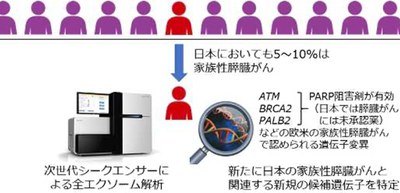
Identification of Potential Susceptibility Genes for Japanese Familial Pancreatic Cancer
A group of researchers from Osaka University, Tohoku University, the National Cancer Center, Tokyo Women's Medical University, Kyorin University, and the Mizuho Research & Technologies has identified potential susceptibility genes for Japanese familial pancreatic cancer (FPC).
Families are considered to have FPC if there are 2 or more members of a family who are first-degree relatives (FDRs), such as parents, children, or siblings, who have been diagnosed with pancreatic cancer.
In Europe and the U.S., FPC registration and follow-up studies have been conducted since the 1990s and genes linked to FPC have been identified. As further epidemiological studies are conducted in Europe and the U.S., it has become known that FPC accounts for 5-10 percent of pancreatic cancer cases in those areas. However, no comprehensive analysis of germline variants in Japanese FPC patients has yet been conducted.
Previously, this group led by Professor Shinichi Yachida of Osaka University investigated the history of 1,197 Japanese pancreatic ductal adenocarcinoma (PDAC) patients and reported that 88 (7.3%) of them had at least a pair of affected FDRs.
This time, the researchers performed whole-exome sequencing of germline DNA from 81 Japanese FPC patients. They clarified the genes that predispose individuals to an increased risk of developing FPC in the Japanese population, such as ATM, BRCA2, BRCA1, CHEK2, and PALB2, and identified new potential susceptibility genes, such as FAT4, FAT1, and SMAD4.
Genetic mutations in BRCA (breast cancer susceptibility gene)1, BRCA2, and PALB2 (partner and localizer of BRCA2) discovered in this study are known to be associated with hereditary breast and ovarian cancer syndrome (HBOC).
In addition, the poly(adenosine diphosphate–ribose) polymerase (PARP) inhibitor olaparib had antitumor activity in patients with a germline BRCA1 or BRCA2 mutation. (“Maintenance Olaparib for Germline BRCA-Mutated Metastatic Pancreatic Cancer,” Golan T et al. The New England Journal of Medicine, 2019) and HBOC patients.
The researchers of this group showed that FPC patients in Japan had potentially deleterious causative germline variants in tumor suppressor genes. Deleterious germline variants of cancer susceptibility genes are considered to play a key role in the emergence of familial groupings of pancreatic cancer.
Regular pancreatic cancer screening is recommended for individuals from FPC families and examining familial history of cancer as well as identifying FPC predisposition genes will be helpful in developing treatment strategies.
Additionally, pathogenic germline variants in cancer predisposition genes could be found in a hereditary cancer gene panel test. Depending on hereditary pancreatitis-related genes, specific antitumor agents may be effective for some FPC patients.
To conduct large cohort studies of FPC patients, the Japanese Familial Pancreatic Cancer Registry (JFPCR) has started.
Figure 1
The article, “Whole-exome Sequencing Reveals New Potential Susceptibility Genes for Japanese Familial Pancreatic Cancer”, was published in Annals of Surgery at DOI: 10.1097/SLA.0000000000004213.
Related Links
Department of Cancer Genome Informatics, Graduate School of Medicine, Osaka University (link in Japanese)
